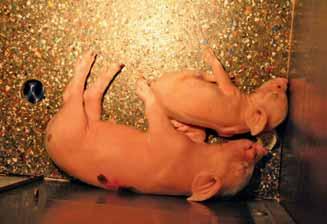The importance of colostrum
Lack of disease resistance
Nutrients Energy Antibodies
te ct ed
Colostrum is essential. The newborn piglet doesn't have any antibodies of its own. It needs energy, partly to keep itself warm. The protein provides nutrients and antibodies.
ig ht pr o
For each litter of piglets, the sow produces a fixed quantity of colostrum containing antibodies. The more piglets in a litter, therefore, the fewer antibodies are available for each piglet. The colostrum supply is triggered during farrowing and the concentration of antibodies drops very quickly. Mark the firstborn piglets and, once they have filled their bellies, put them behind a partition to allow the lastborn piglets to drink extra milk. Piglets born to gilts are even more susceptible: a gilt’s immune system isn't yet fully developed and she hasn’t been exposed to all of the pathogens present on the farm. Plus gilts themselves excrete more pathogens than an adult sow, putting the piglets at greater risk of infection. Keep the piglets of gilts separate from those of adult sows and vaccinate the gilts to maximise their immunity.
The level of antibodies in the colostrum depends on the number and type of pathogens to which the sow has been exposed, the reaction to them and the time of exposure. As a result, older sows often have more antibodies in their colostrum than gilts. Vaccinations for diseases such as circo or influenza may result in a higher concentration of antibodies to those specific pathogens in the colostrum.
co p
yr
Does the piglet lack antibodies? Is this down to the farmer, the piglet or the sow? • Sow hasn’t produced enough colostrum (quantity). • Sow doesn’t have enough antibodies in the colostrum (quality). • Piglet hasn’t drunk enough and/or has drunk too late.
LOOK - THINK - ACT What does this thin piglet tell you? Crooked back, head down, sunken flanks and a thin rump. This piglet hasn’t drunk enough colostrum. He runs a high risk of succumbing to disease. He doesn’t have enough anti-infection agents in his intestines or antibodies in his blood. As a result, a pathogen could easily flourish in his intestines and infect him. In addition, his intestines won’t develop so well because he lacks growth factors from the colostrum. Finally, he is not receiving the necessary nutrients and will starve, become chilled and then die.
6 . I n th e f a r row i n g h o u se: the pi g let
71





